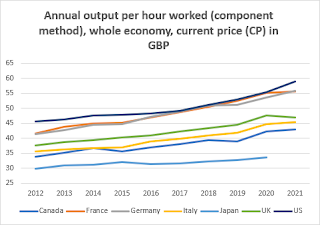One business issue that keeps resurfacing here in the UK is that of productivity. The big question is, 'Why has it flatlined here since 2008?' I noticed that, yet again, the Bank of England has predicted 0% productivity growth for this year in the UK.
I have much experience of living and working in other cultures. I was born in the Netherlands and lived there for a time. I have also lived and worked in South America, Spain and India, and most recently, in the USA from 2005-2015. Therefore, I have some practical context to explain what's happening in the UK, relative to other global economies.
1. Business transactions take too long to carry out here in the UK. For example, buying and selling our house in Boston took less than a month. In the UK, it takes far longer.
2. Business people need to be bolder. They also rely too much on gut feeling and should incorporate more data, more rigorous thinking, and fewer biases into their decision-making
3. Training and education. A lot of British businesspeople need help to write accurate, grammatical English. They need help to do basic maths.
Lack of education has got to be a key reason for our poor productivity. We need better education - more executive coaching and business education, both online and traditional.
And the general level of primary education needs to improve here. Spelling, grammar, maths, you name it. Knowledge of foreign affairs, news and even a foreign language is good too.
4. Investment has got to come a close second. If you want to be a productivity ninja, you need the tools. I worked at one company where I was managing a six-figure marketing budget, but the company gave me a faulty computer that crashed the entire time.
Talk about an unproductive false Economy! All the evidence points to us needing to spend more on equipment, from essential productivity apps to tools like DocuSign or Microsoft Teams, to speed up business interactions. In addition, there is far more employee training in the US.
When I was at business school, many MBAs were financed by their employers. I rarely see that in the UK. Why aren't UK companies trying to develop their employees - sending our employees on professional training to boost their skills or even actively encouraging employees to get training themselves.
I have done much of this in my career, but these efforts were only supported regularly in the US. In the UK, companies prefer to poach talent from other companies rather than develop talent internally.
5. We have seen a fall in leadership quality in the UK. You only have to look at the government right now. Our Prime Minister pledged five points that he would improve. Most of those situations are now worse, and he hasn't even improved one
Failing to hit these goals will undoubtedly reduce our productivity and competitiveness as a nation.
6. We in the UK have a fatal weakness for conventional wisdom. I'm paraphrasing Dominic Cummings here. But undoubtedly, one of the reasons his Brexit campaign defeated the much better-funded and institutionally backed remain campaign was because his team was creative and unorthodox. The other side was neither (To clarify, I was and am pro-European Union, but I admired the Brexiteers' strategy and execution).
Even though productivity declined for fifteen years or more before the trend for remote work even began.
If you want help thinking more unconventionally, I recommend this Malcolm Gladwell book for inspiration.
website.
website.




No comments:
Post a Comment